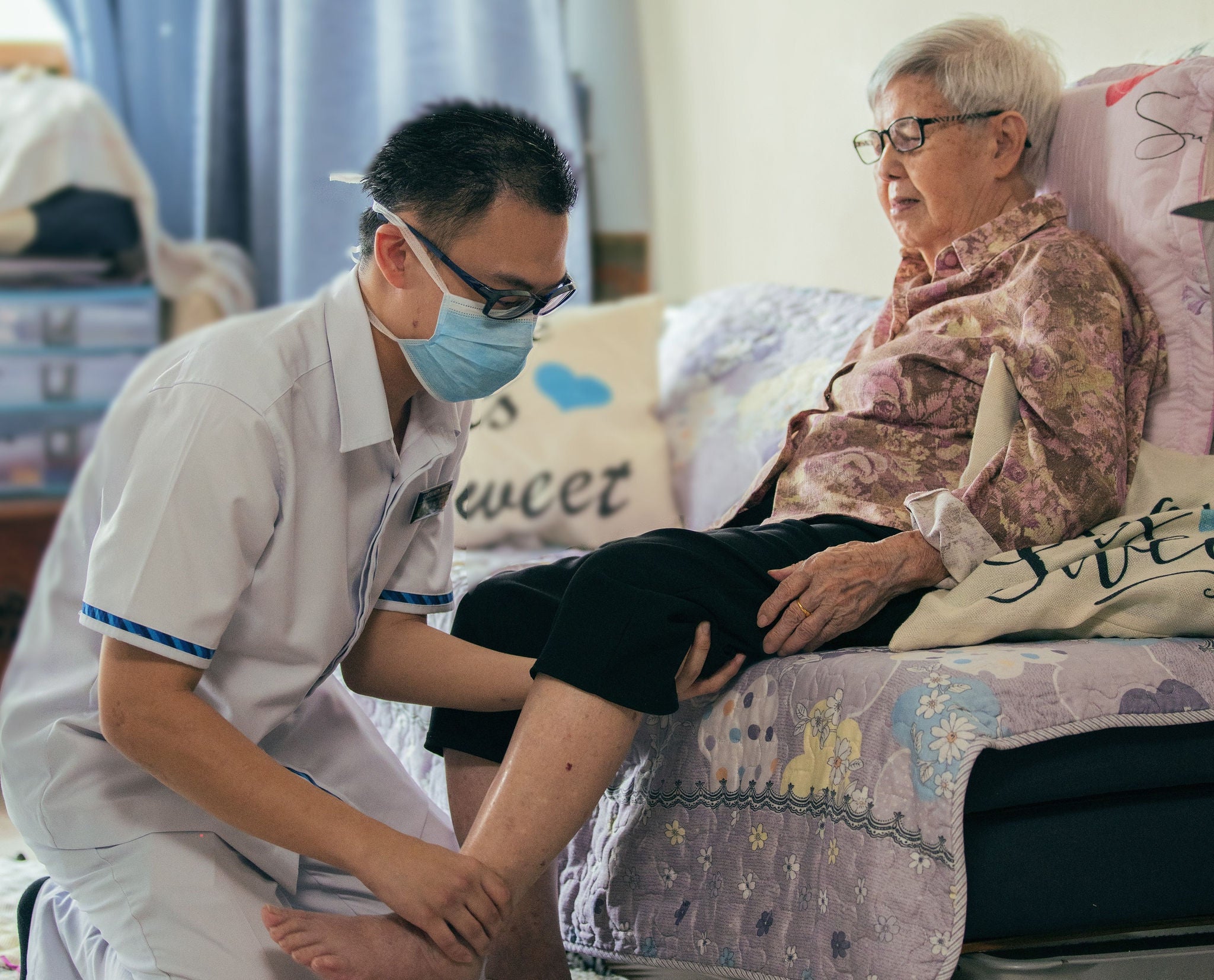
Senior Staff Nurse (Community Nurse), Goh Rui Hao, SGH, assessing Mdm Loke for stiffness. Source: Temasek Foundation.
Attending medical appointments can be very challenging for people living with brain and nerve conditions, due to difficulties moving around, finding their way or needing to rely on others for assistance. Mr Stanley Koh, caregiver to his wife with dementia, and Parkinson warrior Mdm Loke Yuet Moey share how home visits under NNI’s community programmes have helped them.
Changed by dementia
Mrs Beatrice Koh*, 69, was known among friends and family to be a demure, pleasant and generous woman. So it was shocking when she started to be aggressive and abusive.
After seeing many different doctors, Beatrice was finally diagnosed with frontotemporal dementia (FTD) – a type of dementia that causes language and behavioural problems.
Now some 11 years later, Beatrice no longer experiences behavioural issues, but her condition has progressed such that she is unable to speak and is mostly bedridden.
A loving husband
As her main caregiver for over a decade, Beatrice’s husband Mr Stanley Koh*,69, can now anticipate her needs through the sounds she makes.
“Sometimes when she groans, it means she wants physical touch so I will stroke her forehead which she likes. Or, I might rub medicated oil on her nose, massage her or give her something to drink,” shared Stanley.
System of support
Beatrice used to go for annual check-ups at NNI, but has not been recently due to mobility issues and COVID-19. These days, her health issues are not directly related to her dementia. Instead, they are common problems such as migraine, constipation and arthritis.
In 2021, Beatrice and Stanley joined the NNI Community Health programme, and community nurses from Changi General Hospital trained by NNI specialists make regular home visits, helping to address these ailments.
For instance, they brought medicated patches to help with Beatrice’s arthritis. They also switched Beatrice from anti-constipation oral medications, which did not work well, to suppositories which have been more effective.
Stanley said, “I am very thankful for the community nurses who are empathetic, comforting, and just a text message away. They have been much needed help for my wife and me.”
*Names have been changed to protect the family’s privacy
The NNI-Community Health programme is available for NNI @ Tan Tock Seng Hospital (TTSH) patients with neurodegenerative conditions like Parkinson’s disease, dementia, multiple sclerosis and neuromuscular diseases who have difficulty coming for clinic appointments. If you or your next-of-kin is interested in joining the programme, speak to your attending doctor or nurse during your visit. Click here for more information.
Losing independence
After a bad fall in 2018 that landed Mdm Loke Yuet Moey, 86, in the hospital, Mdm Loke was identified as a ‘high risk’ Parkinson’s patient due to poor balance and freezing (being unable to move temporarily). She had been diagnosed with Parkinson’s disease (PD) in 2016.
PD is a neurodegenerative disorder that causes symptoms such as stiffness, slow movements and shaking of hands and legs at rest. The condition gets worse over time and there is currently no cure.
Mdm Loke now struggles to even walk short distances, having to use a wheelchair or a walking frame at home. This loss of independence has made it difficult for Mdm Loke to adjust to life with PD.
To help Mdm Loke and her family manage her PD, she was enrolled in the Temasek Foundation Parkinson’s Disease Community Care Programme (TFPDCCP) in February 2021. Now, a trained Community Nurse from Singapore General Hospital (SGH) visits Mdm Loke regularly at home and her case is discussed by the multi-disciplinary team at the Singapore General Hospital (SGH). This allows them to monitor her condition closely so they can identify problems and provide timely advice and support in between her hospital appointments.
Gaining hope
When Mdm Loke’s Community Nurse noticed that she suffered from leg pain, he informed the neurologist who then prescribed her pain relief medication. This helped her walk better without Mdm Loke having to visit the specialist outpatient clinic. During a home visit, her physiotherapist taught Mdm Loke exercises to help with the pain and the team installed grab bars in her toilets to prevent falls.
The programme, supported by the Temasek Foundation, has not only benefited Mdm Loke, but also her daughter Mdm Tang as her main caregiver. Mdm Tang received training on how to manage her mother’s condition and appreciates the team checking on her mother’s physical and mental well-being. “I’m very thankful for the support to help my mother maintain her quality of life, and for me to be a better and more confident caregiver.”
The TFPDCCP is available to SGH patients with PD living in Tiong Bahru, Telok Blangah, Katong, Chinatown and Bukit Merah. SGH patients with moderate to advanced stages of PD and their caregivers may indicate their interest for this service through their doctors. Click here for more information.

Mdm Tang (left) with Mdm Loke. Source: Temasek Foundation.
This article was published in the National Neuroscience Institute's NeusLink magazine, which covers articles about NNI updates and brain, spine, muscle and nerve conditions in English and Chinese - to read more articles, click here!













 Get it on Google Play
Get it on Google Play